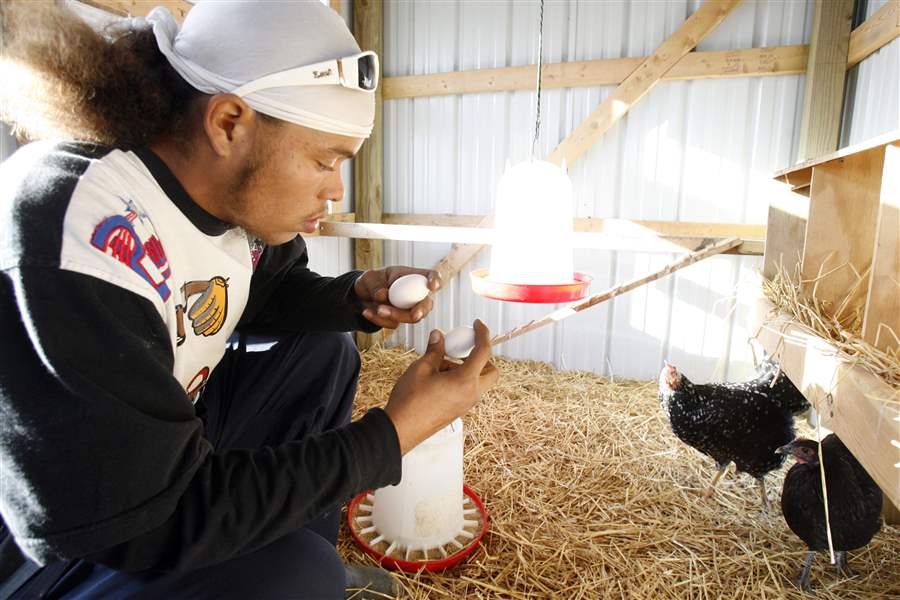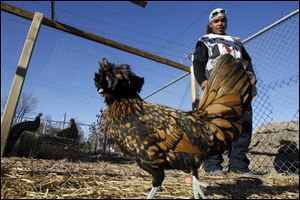
Raising chickens helps teens build life skills
11/15/2009
Rob McCreary collects eggs in the laying hens' coop at the Toledo Grows mini-farm.
The Blade/Andy Morrison
Buy This Image

Rob McCreary, 18, is among those responsible for caring for and feeding the chickens and turkeys raised by Toledo Grows.
City-raised chickens are showing up on area banquet tables, thanks to a local program that works with troubled teens to teach them a variety of skills as they raise animals in an urban setting.
The chickens were raised for eight to 10 weeks by Toledo Grows, which employs about 100 youth in partnership with the Community Integration & Training for Employment (CITE) job-training program of the Lucas County Juvenile Justice Division. Toledo Grows is an outreach effort of Toledo Botanical Garden.
"The program helps teenagers form work habits and transferable skills that will benefit them throughout their whole lives," said Michael Szuberla, Toledo Grows manager. "Some of the things are punctuality, reliability, attention to detail, team work, pattern recognition, and delayed gratification. The teens are at risk for poverty, pregnancy, drug addiction, and delinquency.
"This program is an oasis for them. It's like going to the farm in the country. They are safe. It's a relaxing place to be. It allows them to think about who they want to become and to formulate career goals and formulate a plan to achieve them."
But it all boils down to growing nutritious food and rebuilding communities around food.
Meat chickens, laying chickens, and turkeys are raised in the fenced-in mini-farm on Oneida Street and Locust Street. But now that the meat chickens have been taken to a processing plant in Holgate, Ohio, near Napoleon and frozen for later use, the five turkeys free-roam the yard while the beautiful laying chickens strut around their pen.

Rob McCreary collects eggs in the laying hens' coop at the Toledo Grows mini-farm.
Among those who used city-raised chicken was Judy Trautman of the MultiFaith Harvest Festival. In late October, festival volunteers prepared soup for 130 people made with chickens.
"We're trying to promote groups that have victory gardens," she said about the event. "We use produce from the gardens for a free shared meal."
Ms. Trautman described the chickens as "meaty." "Hands down, it was the best soup I've ever had. The chickens were wonderful, a good size, plump and big, " she said. "The chicken was healthful in about any way possible. They had a wonderful flavor. We've forgotten how nice chicken can taste when it's not factory produced."
A few days later, a fund-raiser was held at Manos Greek Restaurant for the Toledo Grows Seed Swap event in February. Restaurant owner Manos Paschalis cooked Toledo Grows chickens in two soups - chicken lemon rice and one made by his son-in-law with "south of the border" flavor - and a chicken phyllo pie for 80 people. "The chickens are excellent," Mr. Paschalis said. "They are a moister chicken. It's a big chicken, twice the size of a regular chicken. It's all meat. The skin is white."
Mini farm
The next night a chicken barbecue by Mr. Bob's Q and Bobby Lockett was held outdoors at Oneida and Locust for the kids who raised the chickens and their families. Not only were the chickens grilled, a potluck rounded out the meal with side dishes to pies.
Mr. Lockett and his crew set up a charcoal pit using no lighter fluid and cooked the plump chicken halves. The birds were so big they were cut into about 14 pieces with each breast half cut three ways. He mopped a secret-recipe barbecue sauce on the chickens.
Mr. Szuberla said that eight youths were "heavily involved" in growing the chickens and 30 occasionally helped. In June they built portable chicken coops that get moved every day. In July the chickens began arriving and the project began.
Rob McCreary, 18, is among those responsible for making sure the chickens were healthy and fed three times a day. He also did a presentation on the project at Toledo Botanical Garden. "It wasn't hard," he said about growing the chickens. "It was a big learning experience."
"I learned how to raise chickens. Everyday I was here faithfully at 7:30 or 8 a.m. and at noon to make sure they had clean water and hay, and then at 6:30 p.m. to do the same," he said. "I wanted to learn more about chickens."
The taste of the chicken at the barbecue was outstanding, according to Mr. McCreary. "We had a nice chicken fest. [They were] very lean. It was great and juicy. I tasted a piece without the sauce, too. It was the freshest chicken in your mouth."
The five turkeys at Toledo Grows won't be ready until Christmas. The birds are a "heritage variety," Red Bourbon and Blue Slate. And since July, laying chickens are being raised for eggs.
"The kids are less attached to the chickens than the turkeys," said Mr. Szuberla. "Egg chickens are good-looking birds. Meat chickens are plain but are voracious eaters."
"These chickens are moving. They are walking around. They get 20 to 30 percent of their calories from foraging," he said. The feed is organic grain.
Mr. Szuberla estimates that 45 chickens remain in the freezer and that they'll be used at upcoming events "We hope to enlarge the program next year," he said. "It's been a successful pilot project."
Meanwhile, Mr. McCreary is anticipating the eggs that will be gathered when the laying chickens begin to lay them in the coming days.
Contact Kathie Smith at:
food@theblade.com
or 419-724-6155.